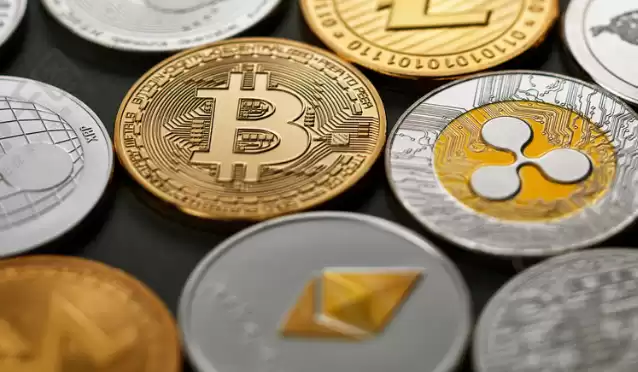-
 bitcoin
bitcoin $87959.907984 USD
1.34% -
 ethereum
ethereum $2920.497338 USD
3.04% -
 tether
tether $0.999775 USD
0.00% -
 xrp
xrp $2.237324 USD
8.12% -
 bnb
bnb $860.243768 USD
0.90% -
 solana
solana $138.089498 USD
5.43% -
 usd-coin
usd-coin $0.999807 USD
0.01% -
 tron
tron $0.272801 USD
-1.53% -
 dogecoin
dogecoin $0.150904 USD
2.96% -
 cardano
cardano $0.421635 USD
1.97% -
 hyperliquid
hyperliquid $32.152445 USD
2.23% -
 bitcoin-cash
bitcoin-cash $533.301069 USD
-1.94% -
 chainlink
chainlink $12.953417 USD
2.68% -
 unus-sed-leo
unus-sed-leo $9.535951 USD
0.73% -
 zcash
zcash $521.483386 USD
-2.87%
How Miners Create New Bitcoin
Miners play a crucial role in the Bitcoin network by verifying and adding transactions to the blockchain, receiving Bitcoin rewards for their efforts.
Nov 22, 2024 at 06:46 am

How Miners Create New Bitcoin
Miners are the backbone of the Bitcoin network. They are responsible for verifying and adding transactions to the blockchain, and they are rewarded with Bitcoin for their work. The mining process is complex and requires specialized hardware, but it is essential for the security and integrity of the Bitcoin network.
Here is a step-by-step guide to how miners create new Bitcoin:
- Miners download the Bitcoin software. This software contains a copy of the blockchain, as well as the rules for verifying and adding transactions.
- Miners connect to the Bitcoin network. They do this by connecting to other miners and nodes on the network.
- Miners wait for new transactions to be broadcast to the network. When a new transaction is broadcast, it is added to a mempool, which is a pool of unconfirmed transactions.
- Miners select a group of transactions from the mempool to be included in a block. A block is a collection of transactions that have been verified by the miner.
- Miners solve a complex mathematical problem to create a hash for the block. The hash is a unique identifier for the block, and it is used to verify that the block is valid.
- Miners broadcast the block to the network. Other miners on the network verify the block and add it to their copy of the blockchain.
- The miner who created the block is rewarded with Bitcoin. The reward is currently 6.25 Bitcoin, and it is halved every four years.
The mining process is essential for the security of the Bitcoin network. It is a distributed process, which means that there is no single point of failure. This makes it very difficult for attackers to compromise the Bitcoin network.
The mining process is also competitive. Miners are constantly competing to be the first to solve the mathematical problem and create a block. This competition helps to ensure that the Bitcoin network is secure and that transactions are processed quickly.
The Difficulty of Mining Bitcoin
The difficulty of mining Bitcoin is constantly increasing. This is because the Bitcoin network is designed to produce a fixed number of Bitcoin over time. As more miners join the network, the difficulty of mining Bitcoin increases in order to keep the block production rate constant.
The difficulty of mining Bitcoin is measured in hashes per second (H/s). The current difficulty is around 30 trillion H/s. This means that a miner would need to perform 30 trillion hashes per second in order to solve the mathematical problem and create a block.
The difficulty of mining Bitcoin makes it very difficult for individual miners to be successful. Most miners now join mining pools, which are groups of miners who combine their resources to increase their chances of finding a block.
The Profitability of Mining Bitcoin
The profitability of mining Bitcoin depends on a number of factors, including the price of Bitcoin, the cost of electricity, and the difficulty of mining Bitcoin.
The price of Bitcoin has been volatile in recent years, but it has generally been trending upwards. This has made mining Bitcoin more profitable, as miners are able to sell the Bitcoin they mine for a higher price.
The cost of electricity is also a major factor in the profitability of mining Bitcoin. Miners who live in areas with high electricity costs may find it difficult to make a profit.
The difficulty of mining Bitcoin is also a factor in the profitability of mining Bitcoin. As the difficulty of mining Bitcoin increases, it becomes more difficult for miners to find blocks. This can reduce the profitability of mining Bitcoin.
How to Start Mining Bitcoin
If you are interested in mining Bitcoin, there are a few things you need to do:
- Purchase mining hardware. You can purchase mining hardware from a variety of online retailers.
- Join a mining pool. Mining pools are groups of miners who combine their resources to increase their chances of finding a block.
- Set up your mining software. The mining software will connect you to the mining pool and allow you to start mining Bitcoin.
- Start mining Bitcoin! Once you have set up your mining software, you can start mining Bitcoin. You will need to keep your mining hardware running 24/7 in order to maximize your chances of finding a block.
Disclaimer:info@kdj.com
The information provided is not trading advice. kdj.com does not assume any responsibility for any investments made based on the information provided in this article. Cryptocurrencies are highly volatile and it is highly recommended that you invest with caution after thorough research!
If you believe that the content used on this website infringes your copyright, please contact us immediately (info@kdj.com) and we will delete it promptly.
- Super Bowl LX: Coin Toss Trends Point to Tails Despite Heads' Recent Surge
- 2026-01-31 07:30:02
- Aussie Prospector's Ancient Find: Japanese Relics Surface, Rewriting Gold Rush Lore
- 2026-01-31 07:20:01
- US Mint Adjusts Coin Prices: Clad Collector Sets See Significant Hikes Amidst Special Anniversary Releases
- 2026-01-31 07:20:01
- THORChain Ignites Fiery Debate with CoinGecko Over Bitcoin DEX Definitions: A Battle for True Decentralization
- 2026-01-31 07:15:01
- Fantasy Football Frenzy: Key Picks and Pointers for Premier League Round 24
- 2026-01-31 06:40:02
- Cryptocurrencies Brace for Potential Plunge in 2026 Amidst Market Volatility
- 2026-01-31 07:15:01
Related knowledge

How to Develop a Crypto Exit Strategy to Secure Your Profits?
Jan 22,2026 at 10:19am
Understanding Market Cycles and Timing1. Cryptocurrency markets operate in distinct phases: accumulation, markup, distribution, and markdown. Recogniz...

How to Find and Invest in Promising DePIN Crypto Projects?
Jan 19,2026 at 06:19pm
Understanding DePIN Fundamentals1. DePIN stands for Decentralized Physical Infrastructure Networks, combining real-world hardware deployment with bloc...

How to Find Liquidity Pools with the Lowest Impermanent Loss Risk?
Jan 25,2026 at 05:59pm
Fundamental Characteristics of Low-Risk Liquidity Pools1. Stablecoin pairs dominate the lowest impermanent loss environments due to minimal price dive...

How to Analyze Market Sentiment Using the Crypto Fear & Greed Index?
Jan 24,2026 at 09:39am
Understanding the Crypto Fear & Greed Index1. The Crypto Fear & Greed Index is a composite metric that aggregates data from multiple sources including...

How to Hedge Your Crypto Portfolio Against a Market Crash?
Jan 19,2026 at 03:40pm
Risk Assessment and Portfolio Allocation1. Determine the total exposure to high-volatility assets such as memecoins or newly launched tokens without a...

How to Use Technical Analysis for Short-Term Bitcoin Trades?
Jan 25,2026 at 01:00pm
Understanding Candlestick Patterns1. Bullish engulfing formations often appear after a sustained downtrend and signal potential reversal points where ...

How to Develop a Crypto Exit Strategy to Secure Your Profits?
Jan 22,2026 at 10:19am
Understanding Market Cycles and Timing1. Cryptocurrency markets operate in distinct phases: accumulation, markup, distribution, and markdown. Recogniz...

How to Find and Invest in Promising DePIN Crypto Projects?
Jan 19,2026 at 06:19pm
Understanding DePIN Fundamentals1. DePIN stands for Decentralized Physical Infrastructure Networks, combining real-world hardware deployment with bloc...

How to Find Liquidity Pools with the Lowest Impermanent Loss Risk?
Jan 25,2026 at 05:59pm
Fundamental Characteristics of Low-Risk Liquidity Pools1. Stablecoin pairs dominate the lowest impermanent loss environments due to minimal price dive...

How to Analyze Market Sentiment Using the Crypto Fear & Greed Index?
Jan 24,2026 at 09:39am
Understanding the Crypto Fear & Greed Index1. The Crypto Fear & Greed Index is a composite metric that aggregates data from multiple sources including...

How to Hedge Your Crypto Portfolio Against a Market Crash?
Jan 19,2026 at 03:40pm
Risk Assessment and Portfolio Allocation1. Determine the total exposure to high-volatility assets such as memecoins or newly launched tokens without a...

How to Use Technical Analysis for Short-Term Bitcoin Trades?
Jan 25,2026 at 01:00pm
Understanding Candlestick Patterns1. Bullish engulfing formations often appear after a sustained downtrend and signal potential reversal points where ...
See all articles










































































